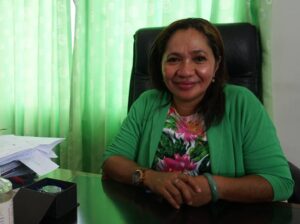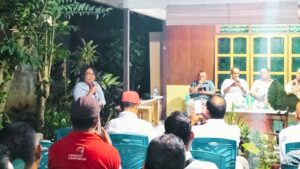Just three days shy of the 2020 simultaneous regional elections D-day, Tiffany Dias (26), suddenly felt doubtful whether she would really use her voting right to actually cast a vote on the ballot on Dec. 9. The woman, who lives in Pancoran Mas Depok, West Java, said she was doubtful whether the General Elections Commission (KPU) in the area where she lived could truly guarantee the health safety of voters.
Even as the voting day had drawn near, Tiffany had yet to receive all the information about the voting protocols that she needed to follow amid the COVID-19 pandemic.
“There has been no information at all, whether on the safety and social order aspects which we need to follow when we come to the voting booths, as well as the voting schedules,” she said during a phone interview on Wednesday, Nov. 25.
Instead of convincing voters not to worry about contracting the coronavirus during the voting process, the Depok chapter of the KPU had chosen to place a big banner inviting all the citizens to use their voting rights. According to observations made by jaring.id along the Pancoran Mas main road, there were no banners informing people on how to observe health and hygiene protocols during the voting day.
Ideally, the commission should provide easy-to-spot banners featuring information on where voters could find hand washing basins and soaps, hand sanitizers, single use gloves, face masks, thermometers, as well as instructions on how voters whose body temperatures exceeded 37.3 degrees Celcius could use the special voting booths and how to get to these special booths.
According to Tiffany, the availability of the information becomes essential as it reduces people’s anxiety about contracting COVID-19 in the voting booth. People have become more anxious than ever about this possibility when they read the news that new COVID-19 cases had soared during the regional elections candidate registration period.
Referring to data from the COVID-19 information and coordination center, about 162 new COVID-19 cases had been recorded during the registration period, which was open from Sept. 4 to 6. The numbers were subsequently increased drastically to 1,087 cases per Sept. 26. At the same time, the number of COVID-19-positive cases in Depok kept on increasing to more than 6,000 cases as per Dec. 7.
The Mekar Jaya subdistrict in Sukmajaya becomes one of Depok’s areas with the biggest number of reported cases, with 58 active cases. It is followed only by the Rangkapan Jaya Baru subdistrict in Pancoran Mas, with 56 active cases. Having heard of the current situation, Tiffany was eventually prompted to request the Depok chapter of the KPU to take more health and hygiene protection measures beyond merely giving away hand gloves and face masks to voters.
“Without these additional measures, I’m concerned that we will further accelerate the spread of the virus. As a result, the number of COVID-19 patients would multiply unrestrained,” Tiffany said.
Yogi Adji, a 27-year-old man who lives in Medan, North Sumatra, also echoed Tiffany’s notions, saying he didn’t get any clear information on how voters could follow health and hygiene safety protocols during the voting day. Narrations about health safety protection which were disseminated across town by the Medan chapter of the KPU did not contain any concrete information on how to implement or apply these safety protocols. Besides preparing the health and hygiene equipments in the voting booth, the KPU is also supposed to be able to provide health services as well as quarantine facilities for citizens who contracted the novel coronavirus severe acute respiratory syndrome (SARS) while they are casting their votes.
“We are entitled to get some personal health protection. Will the KPU or government be responsible if any citizens get the coronavirus while they are trying to vote?” Yogi asked rhetorically upon being contacted by jaring.id over the phone on Thursday, Nov. 26.
Before the Regional Elections cycles started on Aug. 1, the city of Medan, which a lot of people have dubbed as the Parijs van Sumatera, had already recorded 1,471 positive COVID-19 cases. The number increased further throughout the month of September. Up to Dec. 3, the number of COVID-19 cases in Medan had skyrocketed to 6.491 people. Out of the number, 999 people were recovered, while 322 others passed away.
The KPU Medan commissioners board chairman Agussyah Damanik claimed that his party had already conducted regular public education programs to familiarize them on how to implement these health and hygiene protocols during the regional elections. Agussyah said that these programs were conducted in various forms: face-to-face, using props, social media as well as virtual fora.
Regardless of the claims, jaring.id was unable to find even a single content pertaining to these health and hygiene measures on the Twitter and Facebook accounts of the Medan chapter of the KPU. Several days prior to the voting day, the account of the Medan chapter of the KPU instead featured more contents encouraging citizens to exercise their voting rights on Dec. 9, along with information on the Medan mayoral and deputy mayoral candidates.
The situation is much less similar to what jaring.id had found in the social media account of the Depok chapter of the KPU. Within the last week, the account did not disseminate any contents on the health protection protocols which the election organizers had been preparing in place. Instead, the social media account was dominated by information about the candidates, calls on the citizens to vote, as well as what the 2020 regional elections contestants were allowed and not allowed to do using the TikTok application.
Nana Subarna, chairman of the commissioners board of the Depok chapter of the KPU, did not deny that the commission was not conducting enough public education programs on how to implement health safety protocols during the regional elections. A single public announcement banner on the 12 health equipment which people could use in the voting booths during the voting day was nowhere to be seen.
As the voting day had drawn near, according to Nana, the Depok chapter of the KPU office will accelerate the public education programs on the regional elections down to the neighborhood unit level. The public education programs will be facilitated by 36,135 local poll administrators (KPPS), who had just been inducted to office in November 2020. Nana said he hoped that the programs could convince voters that it was safe for them to participate in the democratic party conducted once in every five years.
“We order all the KPPS members to conduct massive public education programs where they are on duty. We also plan to amplify these programs using social media, especially to inform people on voting mechanisms,” said Nana Subarna when jaring.id contacted him by phone on Wednesday, Nov. 25.
The Medan chapter of the KPU, according to him, has also already prepared some scenarios to prevent the formation of big crowds by, among others, regulating the distance among chairs, adding more voting booths as well as regulating the shifts in which voters are allowed to come.
Starting from Aug. 8, the Medan chapter of the KPU has also started to distribute election-related logistical items across 21 regencies.
“We will maximize prevention measures to prevent the formation of big crowds,” Agussyah said.
Furthermore, Agussyah told jaring.id over the phone on Nov. 25: “the voting booths have already applied all the health protocols, don’t worry”.
During the upcoming voting process, the Depok chapter of the KPU will prepare about 36,135 personal protection equipment for officers working across 4,015 polling stations. Meanwhile, to prevent big crowds, the Depok chapter of the KPU has scattered hundreds of voters to additional voting booths. By doing this, one voting booth which is typically capable of accommodating 800 voters, could only accommodate a maximum 500 people.
“We have helped the KPPS officers and security apparatus understand the mechanisms,” Nana said.
The Depok chapter of the KPU said it would provide a special booth for voters who underwent voluntary isolation so they could cast their votes with confidentiality from home or from the hospital. “We are striving to provide voters confidentiality,” he said.
Regardless, up to this day, the Depok chapter of the KPU has yet to obtain data about the exact number of citizens who would be voting from home in quarantine from the COVID-19 task force. Meanwhile, according to data from the COVID-19 coordination and information center, at least about 1,132 voters are currently in home quarantine or are treated in the hospital for COVID-19.
The Depok city’s final voters list includes the names of 1,229,362 individuals in it. Nana said that the Depok chapter of the KPU would make maximum effort to mitigate possibilities of COVID-19 spreading during the voting process. During the voting process, the voting officers who would visit COVID-19 patients at home or in the hospital would also be equipped with complete personal protection equipment such as the hazmat suits, hand gloves, face masks and face shield.
“We will continue to serve our citizens’ constitutional rights although they are currently going through voluntary isolation at home or are being treated in the hospitals,” he said.
Through the KPU Regulation No. 6/2020 on the regional elections during the COVID-19 pandemic, the KPU has guaranteed the safety of voters when they are using their voting rights on Dec. 9. The KPU has also disbursed a budget of more than Rp 300 billion (US$21.3 million) to procure health and hygiene protection equipment for the elections. They spent Rp 53 billion for hazmat suits, Rp 153 billion for thermoguns as well as single-use face masks worth Rp 109 billion.
KPU commissioner Ilham Saputra said he hoped that voters would not hesitate coming to the voting booths directly. He said that the KPU had already taken various measures to give voters a sense of security. During the regional elections this year, the KPU targeted a 70 percent voter turnout nationwide.
“So, we’ve applied the COVID-19 health and hygiene protocols throughout the entire procedure. We want to push public participation so they can comply with the COVID-19 protocols,” Ilham said during a webinar called Pembekalan Pilkada Berintegritas (Briefings for High-integrity Regional Elections) on Nov. 24.
Contrary to these optimistic images, the Indonesian Ombudsman (ORI) was quite dubious about the availability of health facilities for the 2020 Regional Elections. Based on the ORI’s observation across 30 regencies/cities which conducted the 2020 regional elections on Nov. 28 to 30, they discovered three regional KPU chapters which had not distributed personal protection equipment to regency voting officers.
The three regional KPU chapters were located in the Tarakan city in North Kalimantan, the Keerom regency in Papua, as well as the Pelalawan regency in Riau. Meanwhile, the nine regional KPU chapters which had already distributed the personal protection equipment were located in Depok (85.7 percent), South Tangerang (85.7 percent), Indramayu regency in West Java (71.4 percent), the Semarang city in Central Java (57.1 percent), Surabaya city in East Java (85.7 percent), Samarinda city in East Kalimantan (21.4 percent), Ternate in North Maluku (21.4 percent), the Padang Pariaman city in West Sumatra (57.1 percent) and the Northern Lombok regency in West Nusa Tenggara (57.1 percent).
“We’ve obtained these small findings across all parts of Indonesia which are conducting the simultaneous regional elections. This picture can serve as an alarm call for the KPU to immediately accelerate its performance, making sure that the personal protection equipment can be distributed and made available on time,” ORI member Adrianus Meliala said during an online press conference held on Wednesday, Dec. 2.
The Elections Supervisory Body (Bawaslu) has also come with a similar finding. Bawaslu commissioner Mochammad Afifudin stated about 1,420 regional elections voting booths were yet to fulfill the health and hygiene protocols.
“A lot of voting booths can’t fit into the health protection protocols, such as located in very narrow places, or are indoors, and many more,” Afif said in a press conference broadcasted by the Bawaslu YouTube channel on Monday, Dec. 7.
During the last 10 days before the D-day, the Bawaslu has sent about 138 warning letters to all regional election contestants. Moreover, there are 270 incidents related to 18,000 campaign programs which does not comply with health and hygiene protocols.
According to Bawaslu commissioner Fritz Edward Siregar, the government is yet to have a potent strategy to conduct the regional elections during the pandemic. Fritz also believed that the KPU Regional No. 6/2020 was far from being effective in giving voters the sense of safety they needed.
“There’s a sense of discomfort among voters when they know they will have to queue outside of the voting booths,” Fritz continued.
Meanwhile, the National Commission on Human Rights (Komnas HAM) warns about negative consequences that can possibly happen because of the weak coordination among regional KPU chapters representing the provincial, regency and city levels as well as the COVID-19 task force and regional health agencies.
“We still see people neglecting health protocols. This can potentially accelerate the spread of COVID-19,” Komnas HAM commissioner Amiruddin Al Rahab told jaring.id on Monday, Nov. 23.
Therefore, Amiruddin advised the election organizers not to hesitate punishing anyone who violated health protection protocols during the election cycles.
“In order to enforce the protocols efficiently, we need the role and support of all task force members to discipline the people they supervise on the fields,” he said.
This was aligned with President Joko “Jokowi” Widodo’s orders on Nov. 16 that people truly put the health protocols into action instead of just treating them as slogans only.
“We don’t want the sacrifices of our doctors, nurses, medical and paramedical workers to end up in vain simply because the government doesn’t take any stringent actions,” he said, as quoted on the State Secretary press release.
Meanwhile, the COVID-19 task force spokesman Wiku Adisasmito also called on the KPU to be able to minimize direct contacts among voters, between voters and the voting officers as well as among the voting officers.
“Please make sure there won’t be overcrowding in the voting booths. We also call on the public members to pay attention to safe distance between one another as they are queuing inside and outside the voting booths,” Wiku said when he briefed the press in the President’s Office on Thursday, Nov. 26.
The Association of Elections and Democracy board of advisors member Titi Anggraini also highlighted the importance of COVID-19 infection risk mitigation during the regional elections. Up to this day, according to Titi, the KPU is yet to be able to calculate exactly the worst possible scenario of conducting the elections during the pandemic.
“The KPU is yet to convey the worst case scenario from the elections openly to the government and the election organizers,” Titi told jaring.id via WhatsApp on Monday, Nov. 30.
Titi said she did not want the COVID-19 referral regional hospitals to be overburdened by [novel coronavirus SARS] patients from the 2020 regional elections. In Jakarta, the number of occupancy rates in referral hospitals soared to more than 70 percent with COVID-19 patients. The number far exceeds the 60 percent threshold set by the World Health Organization. In Bandung, meanwhile, the occupancy rate of the Hasan Sadikin public hospital has exceeded 94 percent.







